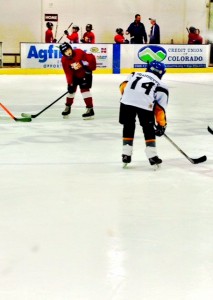I interviewed Dr. Megan Stellino yesterday, and if you have kids in sports – you want to hear this.
 We’re talking any sport or activity. And children of any age, from 2 to 22…and beyond: this applies to you. How we as parents, teachers, siblings, peers all impact the critical development of our young athletes. We even touch on motivation beyond sports and into school.
We’re talking any sport or activity. And children of any age, from 2 to 22…and beyond: this applies to you. How we as parents, teachers, siblings, peers all impact the critical development of our young athletes. We even touch on motivation beyond sports and into school.
Usually I reserve these for our free members-only library, but this one is too important! So click here to listen in immediately to this fantastic 62min audio/mp3.(Or right click/save as to download)

Megan is a Professor at University of Northern Colorado and her research focuses on the influence that significant others (parents, coaches, teachers, peers, siblings etc) have on the developmental psychosocial components (perceptions of competence, motivation, body image, and affective responses) of youth sport and physical activity and social and psychological factors that affect children’s activity choices…. and ultimately how this impacts obesity propensity.
All very important issues.
I absolutely loved her authenticity on the challenges of being an expert on all this first and now applying her expertise first-hand, while in the trenches of motherhood. Yes. Application when your own emotions are triggered is a lifelong journey my friends! I’m pretty sure you’ll agree? 🙂
Here are just a few points we covered:
1. Why do we, as parents, care and worry so much about what activities and sports our children are participating in and how they’re doing?
We invest so much as parents in our children’s sport/activity experiences. So much time, energy, emotion. This is where my conversation with Megan begins: around what’s called “parental moral worth” and it’s strong connection to sport. We talk about why this is so even at the youth sport level. And you’ll be happy to hear, in your quest for balance and connection, that this is OK! Of course we dive in much deeper during our hour-long call…so be sure to listen in when you can!
As I continue to grow and explore emotional intelligence as a certified EQ assessor and a busy, balance-seeking mom, I know all too well that we do care… and sometimes this “caring” creates stress.
2.How much should we care and how do we navigate and manage the emotions?
Whether you’re the quiet parent who’s biting your tongue when your son misses a goal or the screamer trying to tell your daughter to get in position…just trying to help. We all often wonder: how involved should you be?
Megan shares the curvilinear results of both the research and anecdotal evidence on perceptions of parental pressure & support and the emotional outcomes for young athletes. In other words: what are the results of being over-involved vs. under-involved?
And my very favorite part of the interview
3. What’s the best thing you can say to your child after practice, a game, or even a test or school related event?
You might be surprised to hear the pitfalls of asking “Did you have fun?!” (Gulp. I thought this was a good one! 😉 )
So what should you say? You may have heard this part before: that “I love watching you play!” is one of the best things you can say at any age. But I bet you never learned why this is so important. Listen in starting at about 30:55 to learn why this is so. Absolutely fascinating!!
Lastly: for those who do listen in, we ran out of time and didn’t get to circle back around to the implications of parents coaching their own children. So I asked Megan a few questions offline and here’s what she had to say:
4. Is it okay to coach your own children? Why/Why not?
The implications of parents coaching their own kids are a “mixed bag” – it is a great way for parents to give of themselves and potentially connect over something both they and their children love, BUT it can also create too much pressure for children and make the relationship confusing for both parents AND their children.
- A mom/dad should be a parent 1st and coach 2nd in this situation and that isn’t always the priority order for the parent or how it is perceived by the child. So, it becomes a precarious balance in the parent-child relationship.
- The implications are negative if the parent puts coaching before being a parent in front of their child, especially when the child is too young to understand the parent’s commitment to coaching.
- Ultimately, it depends on the parent’s ability to communicate their support to their child separate from their expectations and support as a coach – so, this depends on both the maturity of the parent and the child! It’s hard to generalize about when it’s “okay” and when it’s better “not to” coach your own child.
As noted above, a parent who decides to coach needs to check him/herself about exactly why he/she is coaching – here are a few ?s to ask:
- Is it to fulfill their own ambitions?
- Is it a means of supporting his/her child?
- Is it a way to connect with his/her child?
This is by no means an exhaustive list of questions to ponder on the topic, it’s a start – and really any parent coaching his/her child should assess his/her own motives as well as check in with the child being coached about how that experience is going to feel and perhaps set some ground rules for what it will look like.
Case in point, a 7-year old might be thrilled that Mom is coaching, but be confused about whether to actually call her Mom in front of the other children on the team!
Again, open communication is really essential for this to work, diminish potential stress and be a positive predictor of well-being and development for those involved!
————————-
AGAIN: to get free access to this illuminating 60min audio, visit our free members library. If you’re not yet part of the Spa Time Living community, just enter your email below to get your access code. I NEVER rent, share or sell your information… no matter what.







I recently tried the “I love watching you play soccer” and my seven year old smiled so big. It was incredible how much of a positive effect it had on her!
So great, right Sharon?! They really do light up. I’ve been using this so much though that I have to add in some variations…”I love watching you hustle” etc 🙂
This sounds like it was an interesting interview!
My kids were all involved in one activity and it was something they enjoyed, were good at and wanted to pursue. So it was for their enjoyment and growth.
I never coached them and I was moderately involved – – not uninvolved and not shouting from the sidelines except in excitement sometimes :).
I ALWAYS asked if they had fun. I’d like to know why that’s not a good question . . . but I’ll have to listen later :). I’ve only recently learned that “I love watching you play” is a great thing to say and I now say that to one of my grand kids.
Hi Leanne. Great that you get to bring this to your grandchildren too! And don’t worry – “Did you have fun” isn’t a BAD thing to say…it’s just that your child doesn’t always have fun and the issue comes up when they feel like they’d disappoint you if they say they didn’t have fun. Lots of layers here 🙂